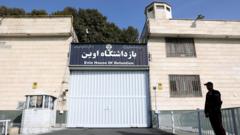Following President Trump's order for military strikes on Iranian nuclear facilities, questions have emerged regarding the constitutional authority behind such actions. While some lawmakers argue that the President overstepped his bounds without congressional approval, others assert that historical precedents provide the President with the necessary authority under Article II of the Constitution.
Assessing Trump's Legal Justification for Military Strikes on Iran

Assessing Trump's Legal Justification for Military Strikes on Iran
The legality surrounding President Trump's recent military actions in Iran raises debates among legal experts and lawmakers.
On the recent military strikes ordered by President Donald Trump against Iranian nuclear facilities, a wave of scrutiny has followed regarding the legality of such a move. Prominent voices within both Democratic and Republican circles have raised questions about whether Trump’s actions adhered to the constitutional framework governing military engagement.
Republican Congressman Thomas Massie criticized the strikes as being "not Constitutional," while his colleague Warren Davidson echoed similar sentiments, struggling to find a constitutional basis for the military actions. On the other hand, Republican Speaker of the House Mike Johnson defended Trump, arguing that the strikes were justified due to an “imminent danger” that warranted immediate action over procedural delays that Congress might entail. He noted that engaging in military action without prior congressional approval has been a long-standing practice across administrations.
To evaluate the constitutionality of the strikes, we must consider relevant sections of the U.S. Constitution, specifically Article I and Article II. Article I grants Congress the explicit power to declare war, while Article II designates the President as the Commander in Chief of the Armed Forces. The White House purportedly justifies the strikes through the latter, arguing that the President can exercise military force in circumstances deemed critical.
Constitutional scholars have varied opinions on the limits and scope of the President’s authority under Article II. Some emphasize that certain conditions, such as immediate threats or national interests like preventing nuclear proliferation, could legitimize Trump’s decision to strike. Claire Finkelstein, a law professor, asserted, “The short answer is yes, he did have the authority here,” endorsing the historical precedent of unilateral military actions by presidents.
Conversely, Andrew Rudalevige, a government professor, voiced his dissent, indicating that Trump lacked the necessary pretext of immediate threat traditionally justified by Article II. Notably, while past Congressional declarations of war, such as the one in 1942 after the Pearl Harbor attack, have been exceedingly rare, recent decades have seen increasing instances of presidents bypassing Congress for military action.
Historical precedent shows that previous presidents, including Barack Obama and Bill Clinton, undertook military operations without Congressional approval, often citing Article II as their legal backing. In Trump’s case, this history was also invoked by Speaker Johnson, who highlighted the similar actions taken by past administrations without facing the same scrutiny.
However, critics of Trump's actions point to the War Powers Resolution of 1973, which was established to curtail the President's ability to engage in hostilities without congressional consultation. While the law does provide for emergency military actions, it recommends Congress be consulted “in every possible instance.” Reports indicated that Trump’s consultations were limited, with Democratic Senate Minority Leader Chuck Schumer receiving a briefing just prior to the strikes.
The War Powers Resolution requires that Congress be informed of military actions within 48 hours. In this instance, Secretary of Defense Pete Hegseth stated that Congressional leaders “were notified after the planes were safely out,” prompting questions if this met the required standards of the law.
As debates continue around Trump's strikes on Iran, the conversation surrounding presidential military powers, historical precedents, and constitutional legitimacy remains pertinent in assessing the current and future landscape of U.S. military engagement abroad.





















